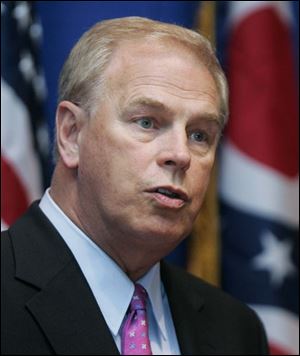
Strickland has '1st conversation' on Ohio education
7/23/2008
Strickland
COLUMBUS - Gov. Ted Strickland threw out a lot of "what ifs?" yesterday.
"What if the school year could be 200 days long instead of 182 days long?"
"What if our schools were year-round schools instead of being closed in the summertime?"
"What if our school day was longer?"
"What if we created a value-added system that measured results and compensated teachers for improving student achievement?"
But while he sought answers to those questions in the first of his 12 Conversations on Education yesterday, he never asked the question: "How do we pay for it?" That, he said, is a question for another day sometime this fall.
The governor has said he would consider his administration a failure if it did not address a school-funding system dependent on property taxes - ruled unconstitutional by the Ohio Supreme Court - that places students in poorer districts at a competitive disadvantage.
Through the forums, which are set to continue Sept. 15, the first-term Democratic governor is soliciting ideas for transforming Ohio's public education system - the emphasis on "public" - into a world-class system.
He said he will put a comprehensive set of proposed reforms before lawmakers in early 2009 to not only improve the system, but also answer that elusive question of how to pay for it.
"They have to go together," Mr. Strickland said after the forum. "You don't say how much you're going to pay for a house until you know what kind of house you're going to build."
About 200 would-be architects of that house - teachers, superintendents, parents, students, charter-school advocates, and business representatives - attended the inaugural at COSI Columbus.
On Aug. 14, the road show rolls into northwest Ohio, stopping at Rhodes State Community College in Lima at 4 p.m. It stops in Toledo at 5 p.m. Aug. 20 at Rogers High School.
Earl Oremus, head of the Columbus nonprofit Marburn Academy for students with learning disabilities, praised Mr. Strickland's suggestion that lesson plans be designed individually for students who learn at different paces.
"I think that is both your boldest principle and the hardest one to implement. ," Mr. Oremus said. "That element of our school system has been very resistant to change. If you succeed making that change, I think it will be enormous, but I would sure would like to hear how you're going to change that system."
The governor, however, responded that he was looking to the crowd, and the 11 others that will follow, to answer that question.
"You really have to start before kindergarten," said Carol Erdman, program director of HeadStart-Help Me Grow in Clinton County. "There's no question in my mind that mothers who are raising babies with special needs who are poor have a bunch of circumstances that are going to be barriers for those children."
Since Mr. Strickland took office in early 2007, primary and secondary schools have seen modest raises in state funding.
As the state's economy faltered, much of the emphasis by the Democratic governor and Republican-controlled General Assembly has been on boosting aid to colleges and universities.
The governor said yesterday that he considers reform of primary and secondary education to be the next logical step.
Although he asked for "wild and crazy ideas," the governor said after the forum that he didn't hear anything he hadn't heard before. He heard members of the audience urge increased parental and community involvement in schools, new emphasis on the arts and physical education in addition to math and science, and increased accountability for public-school performance.
"Education is not about filling an empty vessel. It's about lighting a fire. ," said Charlie Wilson, a Worthington School District board member. "I think we've got to figure out ways to challenge that passion [for learning]. We've got to light that fire."
Contact Jim Provance at:
jprovance@theblade.com
or 614-221-0496.